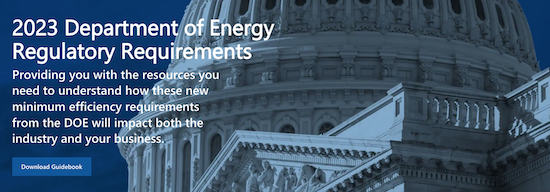Johnson Controls Prepares Channel Partners for DOE 2023 Efficiency Regulations
New standards for residential and commercial HVAC equipment go into effect January 1, 2023.
 Johnson Controls, a global leader for smart, healthy and sustainable buildings is preparing distributors and contractors for the new U.S. Department of Energy’s (DOE) appliance standards for residential and commercial equipment, which take effect January 1, 2023. The standards set new minimum heating and cooling efficiency requirements for residential and commercial central air conditioners and heat pumps, as well as commercial gas furnaces.
Johnson Controls, a global leader for smart, healthy and sustainable buildings is preparing distributors and contractors for the new U.S. Department of Energy’s (DOE) appliance standards for residential and commercial equipment, which take effect January 1, 2023. The standards set new minimum heating and cooling efficiency requirements for residential and commercial central air conditioners and heat pumps, as well as commercial gas furnaces.
Additionally, new test procedures will also take effect, impacting how systems are tested and rated. These changes are part of the Department’s ongoing efforts to reduce the United States’ energy consumption and greenhouse gas emissions. Combined with the first phase of efficiency upgrades which took effect in 2018, it’s considered the largest energy-saving policy initiative in U.S. history.
To meet the requirements and help customers reduce energy use, Johnson Controls is committed to helping its distributors, contractors and partners address the challenges these new regulations bring to make the transition as smooth as possible. Johnson Controls is offering in-depth resources, ongoing webinars and in-person training on the DOE 2023 efficiency transition.
Training for the DOE 2023 regulations focuses on the following key areas:
New minimum product efficiency levels
New testing and measurement changes (ex: SEER vs SEER2)
Residential vs commercial regulations
Differing regional regulations for residential AC equipment (North, Southeast, Southwest)
Inventory sell-through differences between for “date of installation” versus “date of manufacturing” to avoid stranded inventory
Understanding residential system matches (old to new) when creating a solid "phase-in, phase-out" strategy
DOE enforcement and how to avoid noncompliance
“These new regulations, which go into effect on January 1, 2023, create intricate compliance requirements for contractors and distributors of HVAC equipment,” said Chris Forth, vice president of regulatory, codes & environmental affairs, Ducted Systems, Johnson Controls. “It’s absolutely imperative that contractors and distributors alike thoroughly understand how this will impact the industry and their business, and how to properly prepare before these new regulations go into effect. As a leader in HVAC, we’re continuing to take significant steps to serve as a resource to our channel partners to help ensure a smooth transition.”
Johnson Controls has made several investments in recent years to improve product quality and launch new products to meet and exceed these energy efficiency regulations. Within the last three years, Johnson Controls significantly expanded both its Wichita, Kansas, testing laboratory and Rooftop Center for Excellence in Norman, Oklahoma. The Norman facility now features nearly 400,000-square-feet of incremental laboratory and manufacturing space – including a two-story, 52-foot-high testing lab roughly the size of one-and-a-half football fields – and the Wichita testing facility now features 100,000 square feet of laboratory space and advanced equipment.
These extensive upgrades have enabled Johnson Controls to efficiently execute the new mandatory compliance testing while also improving the efficiency, safety, serviceability and reliability of its Ducted Systems products for the following brands: Johnson Controls, YORK®, Luxaire®, Coleman® Heating and Air Conditioning, Champion®, Fraser-Johnston®, TempMaster®, Evcon™ and Guardian®.
To learn more about DOE 2023 energy efficiency regulations and view collateral created to support channel partners, visit www.johnsoncontrols.com/doe.
















